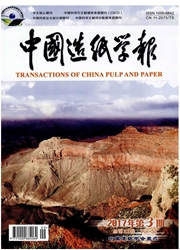

 中文摘要:
中文摘要:
研究了蔗渣、芦苇和荻在烧碱-蒽醌法蒸煮过程中产生甲醇的历程.实验结果表明,3种原料的甲醇产生历程明显不同.蔗渣和芦苇在蒸煮开始时甲醇产生速率较慢;随着蒸煮的进行和温度的升高(蔗渣高于90℃、芦苇高于105℃),甲醇的产生速率迅速增大;蒸煮最高温度下保温时,甲醇产生速率又变慢.荻在烧碱-蒽醌法蒸煮中,甲醇产生历程可分为甲醇快速产生段和甲醇慢速产生段,当温度由50℃升至160℃时,甲醇产生量呈线性增大;之后,甲醇产生速率减慢.3种原料在105℃时的甲醇产生量均为总甲醇产生量的40% ~ 50%.
 英文摘要:
英文摘要:
Methanol formation processes of soda-AQ pulping of bagasse, reed and silvergrass were mainly studied. The results showed that methanol formation processes of bagasse, reed and silvergrass were significantly different. In the initial phase of cooking for bagasse and reed, methanol generated slowly. As temperature was higher than 90℃ for bagasse, higher than 105℃ for reed, the methanol generated quickly. While for the silvergrass soda-AQ cooking, in the temperature range from 50℃ to 160℃, methanol formation increased linearly with temperature. By the end of cooking, the rate of methanol generation was slow. In the initial phase of cooking of bagasse, reed and silverg- rass, 40% - 50% of the total amount of methanol was formed at temperature 105℃.
 同期刊论文项目
同期刊论文项目
 同项目期刊论文
同项目期刊论文
 期刊信息
期刊信息
